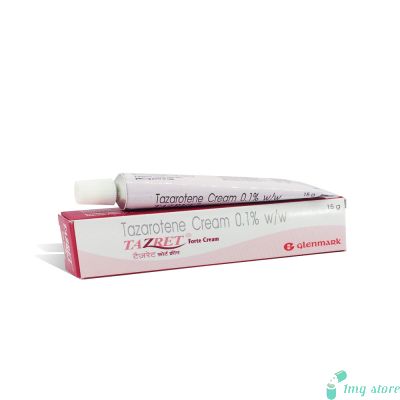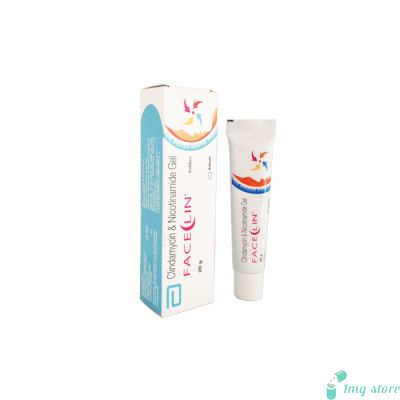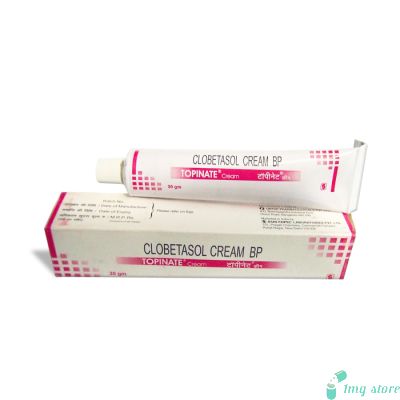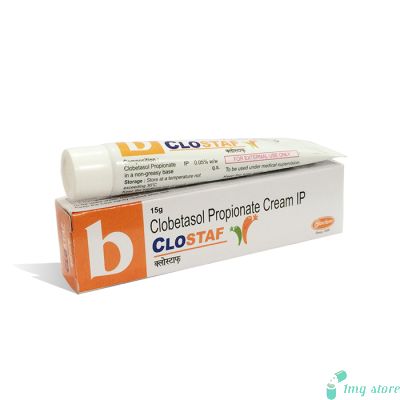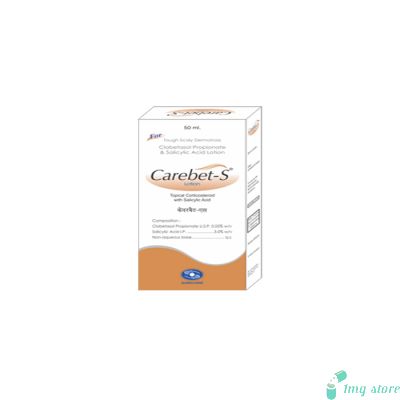Tazret Gel (Tazarotene)
Tazret Gel (Tazarotene) is a topical medication commonly used in the treatment of acne and psoriasis. It belongs to the class of medications known as retinoids, which are derived from vitamin A. Tazret Gel works by regulating skin cell growth and reducing inflammation, which helps to unclog pores and improve the overall appearance and texture of the skin. It is typically applied to the affected areas once daily, following the instructions provided by a healthcare professional. Tazret Gel may cause mild to moderate skin irritation, such as redness and peeling, especially during the initial stages of treatment. It is important to avoid excessive sun exposure and use sunscreen while using this medication. Overall, Tazret Gel is an effective option for managing acne and psoriasis, providing clearer and healthier-looking skin.
Tazret Gel (Tazarotene)- Effective for psoriasis
Tazret Gel, with its active ingredient Tazarotene, is a topical medication widely used for various dermatological conditions. It belongs to the retinoid class of medications, which are derived from vitamin A and are known for their beneficial effects on the skin. Tazret Gel is primarily prescribed for the treatment of acne, as well as for general skin care and the management of psoriasis.
Acne, a common skin condition characterized by the formation of pimples, blackheads, and whiteheads, can be effectively addressed with Tazret Gel. The medication works by regulating the growth of skin cells, reducing inflammation, and preventing the clogging of pores. By promoting the shedding of dead skin cells and controlling sebum production, Tazret Gel helps to unclog pores, prevent the formation of new acne lesions, and improve overall skin appearance.
In addition to its acne-fighting properties, Tazret Gel is also valued for its skin care benefits. Regular use of the gel can enhance skin texture, minimize the appearance of fine lines and wrinkles, and promote a more youthful complexion. Tazret Gel stimulates the production of collagen, a crucial protein that contributes to the skin's elasticity and firmness, resulting in a smoother and healthier-looking skin.
Moreover, Tazret Gel proves to be beneficial for individuals with psoriasis, a chronic autoimmune condition characterized by red, scaly patches on the skin. By normalizing the growth of skin cells and reducing inflammation, Tazret Gel helps to alleviate the symptoms associated with psoriasis, including itching, scaling, and thickened skin patches.
It is important to follow the instructions provided by a healthcare professional when using Tazret Gel, as it may cause temporary side effects such as skin irritation, redness, dryness, or peeling. Typically, the gel is applied once daily in a thin layer to the affected areas of the skin.
Overall, Tazret Gel, containing Tazarotene, offers a comprehensive approach to address acne, improve skin texture, and manage psoriasis. With its proven efficacy and versatility, Tazret Gel is a valuable tool in the field of dermatology, helping individuals achieve clearer, healthier skin.
When using Tazret Gel (Tazarotene), it's important to follow certain precautions to ensure safe and effective use. Here are some precautions to consider:
- Consult a healthcare professional: Tazret Gel is a prescription medication, so it should only be used under the guidance of a healthcare professional who can assess your specific needs and provide appropriate instructions.
- Avoid contact with sensitive areas: Avoid applying Tazret Gel to areas around the eyes, lips, nostrils, and mucous membranes, as it may cause irritation. If accidental contact occurs, rinse thoroughly with water.
- Protect from sunlight: Tazret Gel can increase your skin's sensitivity to sunlight. Avoid excessive sun exposure, tanning beds, and sunlamps. When outdoors, use protective clothing and apply sunscreen (SPF 30 or higher) to exposed skin.
- Use caution with other skin products: Avoid using abrasive or irritating products on the treated areas, such as harsh cleansers, astringents, or peeling agents, as they may exacerbate skin irritation.
- Inform your healthcare professional: Inform your healthcare provider about any other medications, vitamins, or supplements you are taking, as they may interact with Tazret Gel.
- Pregnancy and breastfeeding: Tazret Gel may harm an unborn baby, so it should not be used during pregnancy. If you are breastfeeding, consult your healthcare provider before using Tazret Gel, as it may pass into breast milk.
- Follow usage instructions: Use Tazret Gel as directed by your healthcare professional. Apply a thin layer to the affected area(s) once daily, usually in the evening, unless otherwise instructed.
- Expect initial skin irritation: It is common to experience mild to moderate skin irritation, including redness, dryness, itching, or peeling, especially during the first few weeks of treatment. If severe irritation occurs, contact your healthcare provider.
Remember, these precautions are not exhaustive, and it's important to consult with a healthcare professional for personalized advice and guidance specific to your condition.
The usage of Tazret Gel (Tazarotene) should be determined by your healthcare provider, who will consider your specific condition and provide tailored instructions. However, here is a general guideline for using Tazret Gel:
- Cleanse the skin: Wash your face or the affected area with a mild cleanser and pat it dry before applying Tazret Gel. Make sure your skin is clean and free of any makeup, creams, or lotions.
- Apply a thin layer: Take a small amount of Tazret Gel (about pea-sized) onto your fingertips and apply a thin layer to the affected area(s) of the skin. Gently massage the gel into the skin until it is evenly distributed.
- Avoid sensitive areas: Take care to avoid contact with the eyes, lips, nostrils, and mucous membranes, as Tazret Gel may cause irritation. If accidental contact occurs, rinse thoroughly with water.
- Frequency of use: Tazret Gel is usually applied once daily, preferably in the evening, unless otherwise instructed by your healthcare provider. Follow the recommended dosing schedule and do not exceed the prescribed amount.
- Gradual introduction: In the beginning, your healthcare provider may advise you to use Tazret Gel less frequently, such as every other day, to allow your skin to adjust and minimize potential irritation. Follow these instructions carefully.
- Be patient: Results with Tazret Gel may take time, and improvements may not be immediate. It is important to continue using the medication as directed and not to discontinue treatment prematurely.
- Sun protection: Tazret Gel can increase your skin's sensitivity to sunlight. It is crucial to protect your skin from excessive sun exposure. Avoid prolonged sun exposure, wear protective clothing, and apply sunscreen with a high SPF (30 or higher) when outdoors.
- Follow-up appointments: Your healthcare provider may schedule follow-up appointments to monitor your progress and make any necessary adjustments to your treatment plan. Attend these appointments as recommended.
Always consult your healthcare provider or dermatologist for personalized instructions and advice regarding the usage of Tazret Gel. They will provide you with the most accurate and suitable guidance based on your specific condition and needs.
Tazret Gel (Tazarotene) may cause certain side effects. While not everyone experiences these side effects, it's important to be aware of them. Common side effects of Tazret Gel can include:
- Skin irritation: The most common side effect is skin irritation, which may manifest as redness, dryness, itching, burning, stinging, or peeling of the treated area. This is usually mild to moderate and tends to improve with continued use.
- Sensitivity to sunlight: Tazret Gel can increase the skin's sensitivity to sunlight. This may result in a heightened risk of sunburn or skin reactions when exposed to sunlight. It is important to take precautions such as using sunscreen, wearing protective clothing, and minimizing sun exposure.
- Temporary worsening of symptoms: In some cases, Tazret Gel may initially cause a temporary worsening of acne or psoriasis symptoms. This can include an increase in redness, inflammation, or the appearance of new lesions. This is often a normal part of the treatment process and should subside with continued use.
- Dryness and peeling: Tazret Gel may cause dryness and peeling of the skin, especially during the initial stages of treatment. This can lead to flaking or scaling of the skin.
- Discomfort or tingling: Some individuals may experience discomfort or a tingling sensation at the site of application.
- Allergic reactions: Although rare, allergic reactions to Tazret Gel can occur. Signs of an allergic reaction may include severe itching, rash, hives, swelling, or difficulty breathing. Seek immediate medical attention if you experience any signs of an allergic reaction.
It is important to note that this is not a complete list of side effects, and others may occur. If you experience any persistent or severe side effects, or if you have concerns about any changes in your skin during treatment, it is important to contact your healthcare provider for further evaluation and guidance. They will be able to provide personalized advice and address any specific concerns you may have.
Certainly! Here are some frequently asked questions (FAQs) about Tazret Gel (Tazarotene):
What is Tazret Gel used for?
Tazret Gel is primarily used for the treatment of acne and psoriasis. It helps regulate skin cell growth, reduce inflammation, and improve the overall appearance and texture of the skin.
How does Tazret Gel work?
Tazret Gel belongs to the retinoid class of medications, derived from vitamin A. It works by normalizing the growth of skin cells, preventing the formation of acne lesions, and reducing inflammation in psoriasis. It helps unclog pores, promotes healthy skin turnover, and reduces redness and scaling.
How should I apply Tazret Gel?
Tazret Gel is typically applied to the affected areas of the skin once daily, preferably in the evening. Follow the instructions provided by your healthcare professional or as directed on the product label. Use a thin layer and gently massage it into the skin until it is absorbed.
Can Tazret Gel be used during pregnancy or breastfeeding?
Tazret Gel should not be used during pregnancy as it may cause harm to the unborn baby. If you are breastfeeding, it is important to consult your healthcare provider before using Tazret Gel, as it may pass into breast milk.
Can I use Tazret Gel with other skincare products?
Avoid using abrasive or irritating products, such as harsh cleansers, astringents, or peeling agents, as they may increase skin irritation when used alongside Tazret Gel. It is recommended to use gentle, non-irritating skincare products and consult your healthcare provider for specific guidance.
How long does it take to see results with Tazret Gel?
Results may vary depending on the individual and the specific skin condition being treated. In general, noticeable improvements in acne or psoriasis may take several weeks of consistent use. It is important to be patient and follow the prescribed treatment plan.
Can I expose my skin to sunlight while using Tazret Gel?
Tazret Gel can increase your skin's sensitivity to sunlight. It is advisable to minimize sun exposure, wear protective clothing, and use sunscreen with a high SPF when outdoors. Sunburn can worsen skin irritation, so it's important to take appropriate sun protection measures.
Remember, it's crucial to consult your healthcare provider or dermatologist for personalized advice and guidance regarding the use of Tazret Gel based on your specific condition and needs.
Tazret Gel (Tazarotene) may interact with certain medications and substances. It's essential to inform your healthcare provider about all the medications, including prescription, over-the-counter drugs, and supplements you are taking. Here are some notable interactions:
- Medications containing sulfur, resorcinol, or salicylic acid: Using these products concurrently with Tazret Gel may increase the risk of skin irritation. It is advisable to avoid using them at the same time or as instructed by your healthcare provider.
- Topical products with high alcohol content: Products containing high amounts of alcohol, such as astringents, shaving creams, or perfumes, may cause excessive skin dryness and irritation when used along with Tazret Gel. It is recommended to use gentle, alcohol-free products.
- Medications that increase skin sensitivity to sunlight: Certain medications, such as thiazide diuretics, sulfonamides, and fluoroquinolone antibiotics, may increase your skin's sensitivity to sunlight when used with Tazret Gel. This can heighten the risk of sunburn or skin reactions. Take appropriate sun protection measures and consult your healthcare provider for guidance.
- Skin-drying products: Avoid using products that have a drying effect on the skin, such as products containing high amounts of alcohol, astringents, or medicated soaps. These may exacerbate skin dryness and irritation when combined with Tazret Gel.
- Other retinoid medications: Concurrent use of other retinoid medications, such as isotretinoin or tretinoin, may increase the risk of excessive skin dryness, redness, and irritation. It is best to avoid using multiple retinoids simultaneously unless specifically instructed by your healthcare provider.
- Cosmetic or medicated soaps: Soaps with strong cleansing agents or exfoliating properties may cause additional skin dryness and irritation when used with Tazret Gel. It is advisable to choose gentle, non-irritating cleansers.
It is important to note that this list may not be exhaustive, and there may be other potential interactions. Always consult your healthcare provider or pharmacist for personalized advice based on your specific medications and medical history.
| Manufacturer | : | Glenmark Pharma, India |
| Equivalent Brand | : | Tazorac |
| Generic Search | : | Tazarotene |









